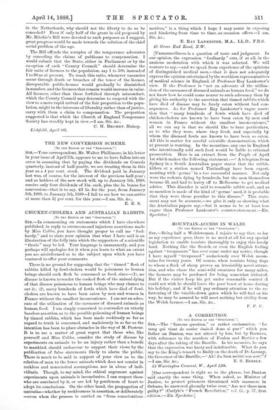.CHICKEN-CHOLERA AND AUSTRALIAN RABBITS.
[To THE EDITOR OF THE "SPECTATOR."]
Sin,—In commenting on statements which I have elsewhere published, in reply to erroneous and injurious assertions made by Miss Cobbe, you have thought proper to call me "fool- hardy," and to state your opinion that what I have said is an illustration of the folly into which the supporters of a scientific " thesis " may be led. Your language is unman nerly, and you perhaps will apologise for it when you learn to whit an extent you are misinformed as to the subject upon which you have ventured to offer your comments.
There is no ground for supposing that the tinned " flesh of rabbits killed by fowl-cholera would be poisonous to human beings should such flesh be consumed as food, since—(1), no disease is known to render the cooked flesh of the animal dying of that disease poisonous to human beings who may chance to cat it; (2), many hundreds of fowls which have died of fowl- cholera are known to have been eaten by men and women in France without the smallest inconvenience. I am not an advo- cate of the utilisation of the carcasses of diseased animals as human food. I am simply concerned to contradict an utterly baseless assertion as to the possible poisoning of human beings by tinned rabbits, which has been made recklessly so far as regard to truth is concerned, and maliciously in so far as the intention bas been to place obstacles in the way of M. Pasteur. It is to me a matter of great regret that those who, like yourself and Miss Cobbe, consider the study of disease by experiments on animals to be an injury rather than a benefit to mankind, should endeavour to support their views by the publication of false statements likely to alarm the public. There is much to be said in support of your view as to the relation of man to the lower animals which does not consist in reckless and nonsensical assumptions, nor in abuse of indi- viduals. Though, to my mind, the ethical argument against experiments upon animals is inconclusive, I can respect those who are convinced by it, or are led by gentleness of heart to adopt its conclusions. On the other hand, the propagation of untruths—whether by recklessness in assertion, or deliberately. —even when the process is carried on "from conscientious motives," is a thing which I hope I may assist in exposing and hindering from time to time, as occasion offers.—I am, Sir, &c., [Unmannerliness is a question of taste and judgment. In our opinion, the expression " foolhardy " errs, if at all, in the anxious moderation with which it was selected. We will venture to say,—and we speak from experience of the opinions of distinguished medical men,—that it does not adequately express the opinion entertained by the worthiest representatives of medical science in England, of Professor Ray Lankester's view. If the Professor is "not an advocate of the utilisa- tion of the carcasses of diseased animals as human food," we do not know how he could come nearer to such advocacy than by giving his authority to the assertion that tinned rabbits which have died of disease may be freely eaten without bad con- sequences. As for Professor Ray Lankester's vague asser- tion that " many hundreds of fowls which have died of chicken-cholera are known to have been eaten by men and women in France without the smallest inconvenience," all we can say is that we should like to hear particulars, as to who they were, where they lived, and especially by whom the diseased fowls are known to have been so eaten. All this is matter for careful scientific demonstration, which at present is wanting. In the meantime, any one in England who intentionally sold such food would be liable to criminal prosecution. Here is an extract from the People of April 1st which makes the following statement :—" A telegram from Sydney in a South Australian paper states that the rabbit- killers at a station named Tintinallogy have been experi- menting with germs' in a too successful manner. Not only were the rodents dying by hundreds, but the men themselves became ill, and had to hurry of to Melbourne to get medical advice. This disorder is said to resemble rabbit scab, and as no mention is made of the kind of germs' used, it is probable that they were those peculiar to this disease." This state- ment may not be accurate,—we give it only as showing what the Australian papers say,—but it seems to he at least less vague than Professor Lankester's counter-statement.—ED. Spectator.]


































 Previous page
Previous page